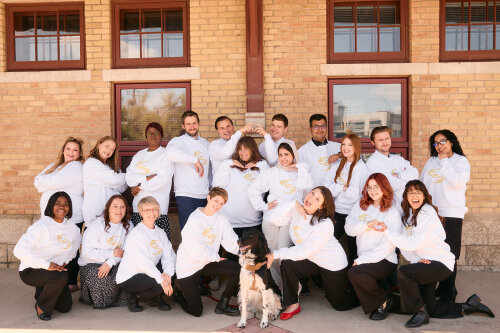Best Collaborative Law Lawyers in Saskatoon
Share your needs with us, get contacted by law firms.
Free. Takes 2 min.
Free Guide to Hiring a Family Lawyer
List of the best lawyers in Saskatoon, Canada
About Collaborative Law in Saskatoon, Canada
Collaborative Law is a legal approach that emphasizes problem-solving to resolve disputes amicably without going to court. In Saskatoon, Canada, this method is often used in family law cases, such as divorce or child custody, but it can be applied to other civil matters as well. The collaborative process involves both parties hiring specially trained collaborative lawyers to assist in negotiating a settlement. The emphasis is on open communication, cooperation, and a commitment to find a mutually satisfactory solution for all involved parties.
Why You May Need a Lawyer
There are several situations where you might consider seeking the services of a collaborative lawyer in Saskatoon:
- Facing a divorce or separation and preferring a more amicable resolution without court intervention.
- Needing to resolve child custody or parenting plan arrangements in a way that prioritizes the best interests of the child and maintains cooperative parenting.
- Looking to settle disputes regarding family property, including division of assets and financial support, through a peaceful negotiation process.
- Wanting a structured environment that allows for respectful dialogue between parties, facilitated by skilled practitioners.
Local Laws Overview
In Saskatoon, collaborative law practices are guided by both provincial family law legislation and the principles of the collaborative process. Key aspects include:
- The Collaborative Family Law Process Act which sets out the framework for using collaborative law in family disputes.
- The requirement for parties to enter into a collaborative law participation agreement that outlines the process and expectations.
- The focus on full disclosure and transparency between parties to ensure fair negotiations.
- The confidentiality of discussions, encouraging open and honest communication.
- A commitment that both collaborative lawyers will withdraw if the case goes to court, ensuring that all efforts are directed towards a negotiated settlement.
Frequently Asked Questions
What is the main benefit of choosing collaborative law over traditional litigation?
Collaborative law allows parties to maintain control over the resolution process, usually resulting in more amicable outcomes and preserving relationships, especially important in family matters.
Can collaborative law be used for non-family disputes in Saskatoon?
While it's most commonly used in family law, collaborative methods can extend to other civil disputes where parties are amenable to negotiation and settlement outside of court.
How long does the collaborative law process typically take?
The timeframe varies depending on the complexity of the case and the willingness of the parties to reach an agreement. It can be quicker than litigation due to fewer formal procedures.
What happens if we cannot reach an agreement through collaborative law?
If no agreement is reached, parties can pursue court proceedings, but they will need to retain new lawyers if the case goes to trial.
Do both parties need to agree to the collaborative process?
Yes, both parties must agree to engage in the collaborative process and enter into a participation agreement to commence negotiations.
Can children be involved in the collaborative law process?
Yes, children's wishes and interests are considered, often with inputs from child specialists, ensuring that the settlement reflects their best interests.
Is collaborative law private and confidential?
Yes, discussions and negotiations are confidential, except where disclosure is required by law, and typically not admissible in court if the process fails and litigation ensues.
How should I prepare for collaborative law sessions?
Preparation involves gathering relevant financial documents, reflecting on goals and concerns, and maintaining an open mind for negotiation.
What kinds of professionals might be involved in the process aside from lawyers?
Professionals such as financial advisors, child specialists, and mental health experts can be involved as neutral parties to assist in reaching a comprehensive agreement.
How are legal costs handled in the collaborative law process?
Costs are generally more predictable than litigation, as both parties pay their respective lawyers, and often fees are agreed upon at the start based on expected scope and duration.
Additional Resources
If you're seeking more information or guidance in Saskatoon, you may consider reaching out to:
- The Collaborative Professionals of Saskatchewan, who provide resources and referrals for finding trained collaborative practitioners.
- Family Justice Services, which offers assistance and resources for resolving family law issues in a cooperative manner.
- Local legal clinics or legal aid offices for those seeking support with fewer financial resources.
Next Steps
If you decide that collaborative law might be the right approach for your situation, consider taking the following steps:
- Research and contact collaborative law practitioners in Saskatoon who specialize in the particular area of law you need help with.
- Schedule initial consultations to discuss your situation and understand how the collaborative process can be tailored to your needs.
- Prepare any relevant documents and information that will be useful in your case discussions.
- Be ready to commit to the process of open communication and cooperation, as your attitude is critical to achieving a positive outcome.
Lawzana helps you find the best lawyers and law firms in Saskatoon through a curated and pre-screened list of qualified legal professionals. Our platform offers rankings and detailed profiles of attorneys and law firms, allowing you to compare based on practice areas, including Collaborative Law, experience, and client feedback.
Each profile includes a description of the firm's areas of practice, client reviews, team members and partners, year of establishment, spoken languages, office locations, contact information, social media presence, and any published articles or resources. Most firms on our platform speak English and are experienced in both local and international legal matters.
Get a quote from top-rated law firms in Saskatoon, Canada — quickly, securely, and without unnecessary hassle.
Disclaimer:
The information provided on this page is for general informational purposes only and does not constitute legal advice. While we strive to ensure the accuracy and relevance of the content, legal information may change over time, and interpretations of the law can vary. You should always consult with a qualified legal professional for advice specific to your situation.
We disclaim all liability for actions taken or not taken based on the content of this page. If you believe any information is incorrect or outdated, please contact us, and we will review and update it where appropriate.











